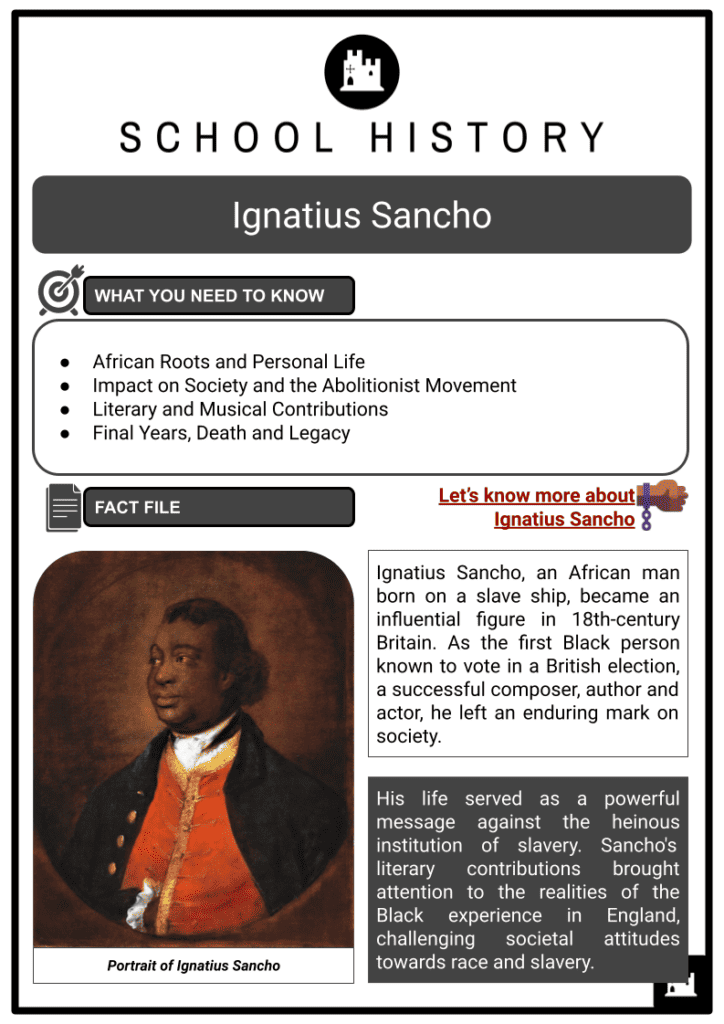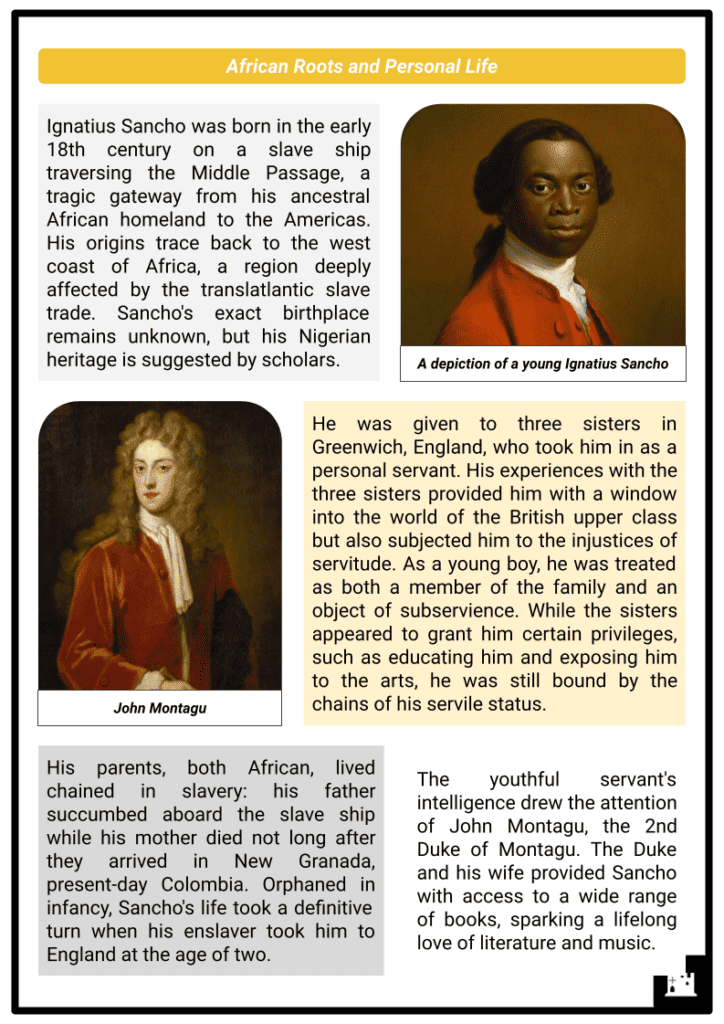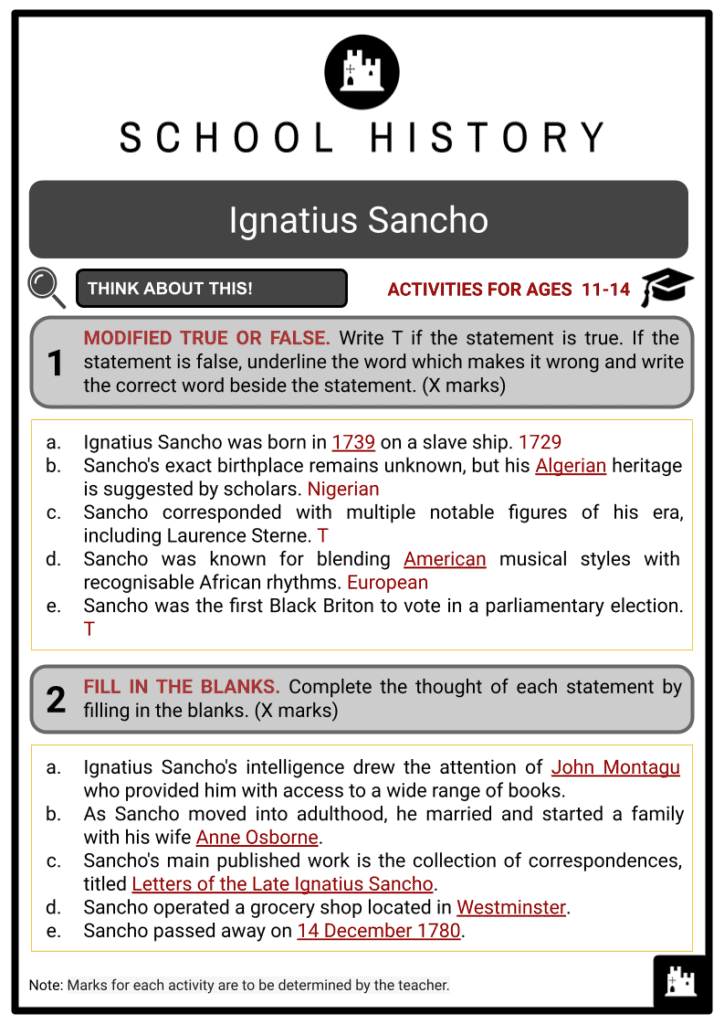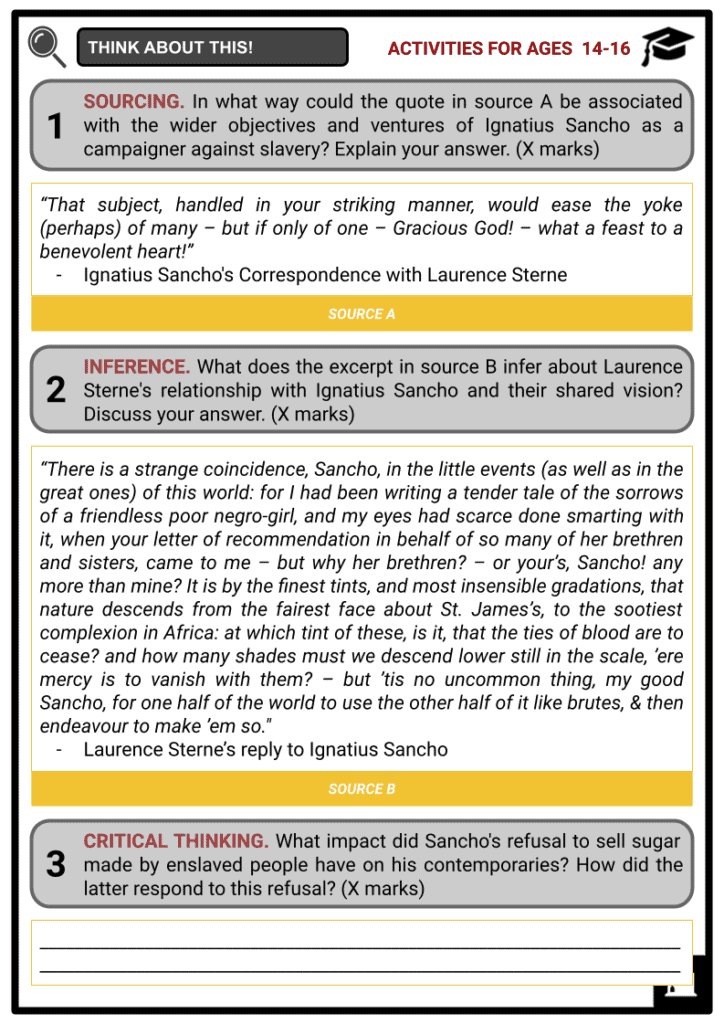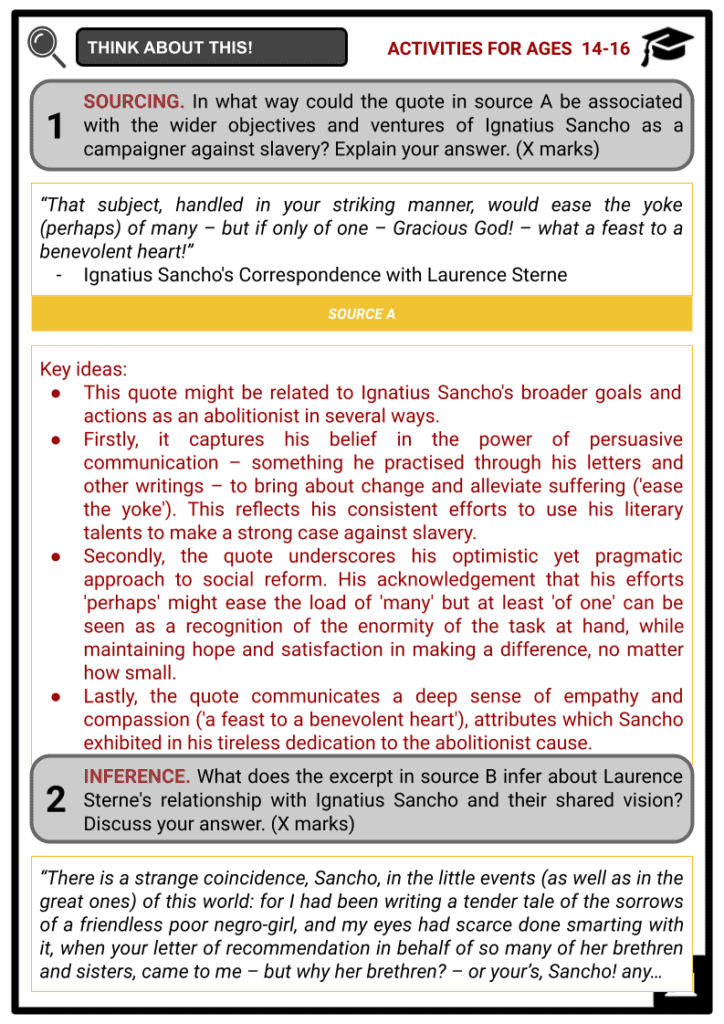Ignatius Sancho Worksheets
Do you want to save dozens of hours in time? Get your evenings and weekends back? Be able to teach about Ignatius Sancho to your students?
Our worksheet bundle includes a fact file and printable worksheets and student activities. Perfect for both the classroom and homeschooling!
Summary
- African Roots and Personal Life
- Impact on Society and the Abolitionist Movement
- Literary and Musical Contributions
- Final Years, Death and Legacy
Key Facts And Information
Let’s know more about Ignatius Sancho!
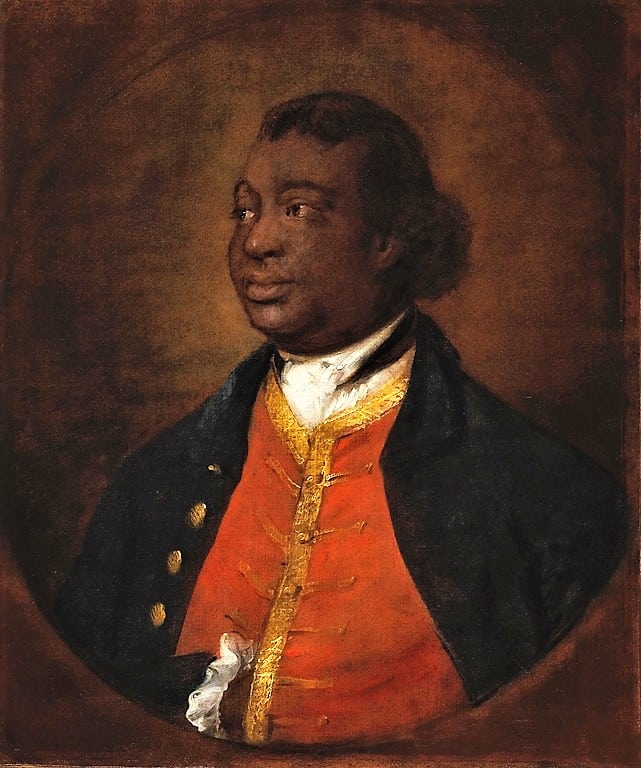
Ignatius Sancho, an African man born on a slave ship, became an influential figure in 18th-century Britain. As the first Black person known to vote in a British election, a successful composer, author and actor, he left an enduring mark on society. His life served as a powerful message against the heinous institution of slavery. Sancho's literary contributions brought attention to the realities of the Black experience in England, challenging societal attitudes towards race and slavery.
African Roots and Personal Life
-
Ignatius Sancho was born in the early 18th century on a slave ship traversing the Middle Passage, a tragic gateway from his ancestral African homeland to the Americas. His origins trace back to the west coast of Africa, a region deeply affected by the translatlantic slave trade. Sancho's exact birthplace remains unknown, but his Nigerian heritage is suggested by scholars.
- He was given to three sisters in Greenwich, England, who took him in as a personal servant. His experiences with the three sisters provided him with a window into the world of the British upper class but also subjected him to the injustices of servitude. As a young boy, he was treated as both a member of the family and an object of subservience. While the sisters appeared to grant him certain privileges, such as educating him and exposing him to the arts, he was still bound by the chains of his servile status.
- His parents, both African, lived chained in slavery: his father succumbed aboard the slave ship while his mother died not long after they arrived in New Granada, present-day Colombia. Orphaned in infancy, Sancho's life took a definitive turn when his enslaver took him to England at the age of two.
- The youthful servant's intelligence drew the attention of John Montagu, the 2nd Duke of Montagu. The Duke and his wife provided Sancho with access to a wide range of books, sparking a lifelong love of literature and music.
- Upon the Duke's death, Sancho fled his oppressive life with the maiden sisters and found refuge with the Dowager Duchess, Mary Montagu. She supported him not only financially, but also intellectually, encouraging him to continue expanding his knowledge and refining his literary talents.
- As Sancho moved into adulthood, he married and started a family. His wife, Anne Osborne, was a West Indian woman of African heritage, and the couple had seven children. Operating a shop in Westminster, he took on the role of a respected family man and businessman, even as he pursued his literary ambitions and fought against the injustices of slavery.
- During his time in England, Sancho demonstrated a strong determination to overcome social barriers and an insatiable thirst for knowledge. These transformative years allowed him to attain a position of influence within society.
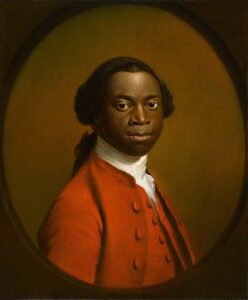
A depiction of a young Ignatius Sancho
Literary and Musical Contributions
- Ignatius Sancho's literary works were exceptionally influential and continue to provide insightful perspectives on his life and times. His main published work is the collection of correspondences, 'Letters of the Late Ignatius Sancho'. These letters offer vivid insights into the life of an African man in England during the 18th century.
- Through his writings, Sancho made keen observations about society, often providing poignant commentary on the human condition and frank discussions about the brutal realities of slavery.
- His letters were punctuated by sharp wit and fluid prose, which captured the attention and admiration of contemporary readers and have continued to captivate future generations.
- Sancho corresponded with multiple notable figures of his era, including Laurence Sterne, the renowned author of 'Tristram Shandy'. His exchanges with such figures form a rich tapestry of dialogues that added depth to the literary landscape of that period.
- His literary contributions played a significant role in shedding light on the often-overlooked Black experience in Britain. By detailing his own experiences and reflections, Sancho brought about an introspective dialogue about race and societal attitudes towards slavery, thereby adding a new dimension infused with African perspectives to the literature of that time.
- In addition to his literary works, Sancho also made significant contributions to music. He was known for blending European musical styles with recognisable African rhythms, resulting in a unique and compelling fusion of musical influences.
- His compositions are a testament to his creativity and deep understanding of different cultures. He managed to capture and blend different musical traditions, creating a novel sound that was a clear reflection of his diverse personal and cultural experiences.
- It's important to note that his musical work, though less known compared to his written contributions, displayed his profound understanding of cross-cultural fusion. These pieces not only enriched the musical landscape of his time but also served as another medium through which he could express his thoughts, experiences and emotions.
Impact on Society and the Abolitionist Movement
- In addition to his literary and musical pursuits, Ignatius Sancho was a dedicated abolitionist. He leveraged his societal standing to actively protest against the practice of slavery, contributing substantially to the abolitionist movement of his time. His first-hand experiences as a former enslaved person provided him with a compelling narrative to advocate for the rights and freedom of enslaved individuals.
- Sancho was not content to merely enjoy the privileges his fame brought him. Instead, he used his voice to expose the cruelties of slavery, often elaborating on these horrors vividly in his letters. These writings engaged the British public, prompting introspection and dialogue about the severe inhumanity of slavery.
- Sancho also operated a grocery shop but it was more than a place of commerce – it was a symbol of his convictions and a means of enacting social change. Located in Westminster, an area known for its affluence and political significance, the shop catered to a wide range of individuals, from intellectuals and politicians to socialites.
- His grocery shop served as a hub of social and political discourse. Visiting his shop offered patrons more than just goods – it provided them with a chance to engage in conversations and debates with the well-read and eloquent Sancho.
- Critically, Sancho's shop was distinctive for its refusal to sell sugar produced by enslaved Africans – an unusual and bold stand for businesses of that time. This was a tangible representation of his commitment to the abolitionist cause. By doing so, Sancho put his beliefs into action, demonstrating to his customers the link between their consumption habits and the transatlantic slave trade. This stance called upon his customers to consider their own role in perpetuating slavery, coaxing them towards more ethical consumer choices.
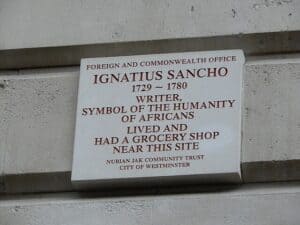
Plaque marking Sancho’s grocery store - His grocery shop was therefore a combination of his entrepreneurial spirit, his commitment to anti-slavery, and his keen intellect, making it a unique, resonant feature of his life and activism. It was more than just a business – it was a platform for change, reflecting Sancho's innovative and dedicated approach to tackling the issue of slavery.
- His efforts were not in vain. His campaign garnered attention and support, leading to increased awareness about the connection between consumer choices and the perpetuation of slavery.
- Sancho was also known for his ability to establish connections with key figures who could help further the cause of abolition. His corresponding relationship with Laurence Sterne, in particular, is well-documented. Sancho's insistence that Sterne use his influence to fight against slavery shows his tenacity and strategic approach towards abolition.
- Taken together, Ignatius Sancho's literary work, personal stand against goods produced by enslaved persons, and active involvement in circulating abolitionist ideas made him a vital figure in the movement towards the abolition of slavery in Britain. His life and work contributed significantly to changing attitudes about slavery, bringing African experiences into mainstream awareness, and adding necessary momentum to the abolitionist movement.
Final Years, Death and Legacy
- The final years of Ignatius Sancho's life were characterised by continued activism and literary productivity, despite several personal challenges. He continued his writings until the later years of his life. By maintaining correspondence with influential figures through his writings, he persistently pushed for the abolitionist cause, contributing to the growing winds of change in British society.
- Despite the adversities he faced, notably deteriorating health, Sancho's determination did not waver. His lasting impact was solidified upon his death on 14 December 1780, leaving a collection of writings that continue to provoke inspiration and illuminate a significant era in history. His death marked a significant loss to the burgeoning abolitionist movement, but his dedication left a lasting legacy that continued to make waves long after his death.
- He was the first known Black Briton to have an obituary in the British press, further signifying his remarkable role in society. In his obituary, he was praised for his exceptional character, intellect, and contribution to literature and music, acknowledging his unique position in British society.
- In addition, Sancho was the first Black Briton to vote in a parliamentary election, leveraging his social standing to advocate for the abolition of slavery. He was a paragon of resilience, earnestness and the power of knowledge, making him a celebrated figure in both literary and civil rights history.
- Sancho's life, from his birth on a slave ship to his final years in England, serves as a narrative of resilience and determination, illustrating the possibilities that emerged amid the oppressive structure of slavery. His legacy continues to inspire and stands as a powerful testament to the transformative power of literature and activism.
Summary of Ignatius Sancho’s Legacy:
- His 'Letters of the Late Ignatius Sancho'
- His musical compositions
- His abolitionist efforts
- His grocery shop in Westminster
- His role as a Black voter
- His obituary's significance
Image Sources
- https://upload.wikimedia.org/wikipedia/commons/3/38/Ignatius_Sancho%2C_1768.jpg
- https://upload.wikimedia.org/wikipedia/commons/thumb/3/37/Portrait_of_an_African.jpg/800px-Portrait_of_an_African.jpg
- https://upload.wikimedia.org/wikipedia/commons/thumb/b/bb/Ignatius_Sancho_DSCN1761.jpg/640px-Ignatius_Sancho_DSCN1761.jpg
Frequently Asked Questions
- Who was Ignatius Sancho?
Ignatius Sancho (1729-1780) was an African composer, actor, and writer who lived in England during the 18th century. He is best known for his letters, which provide valuable insights into the life of a Black man in 18th-century England.
- Was Ignatius Sancho enslaved?
Yes, Ignatius Sancho was born on a slave ship but was later brought to England and not enslaved throughout his life. He worked as a servant in the household of the Duke of Montagu, where he had access to education and opportunities.
- How did Ignatius Sancho help end slavery?
Ignatius Sancho's achievements as a respected intellectual and writer in 18th-century England challenged racist beliefs. His letters humanised the experiences of Black people, inspiring empathy and understanding. Although he did not directly end slavery, his life and writings influenced abolitionists, helping change societal attitudes and contributing to the eventual abolition of slavery.

